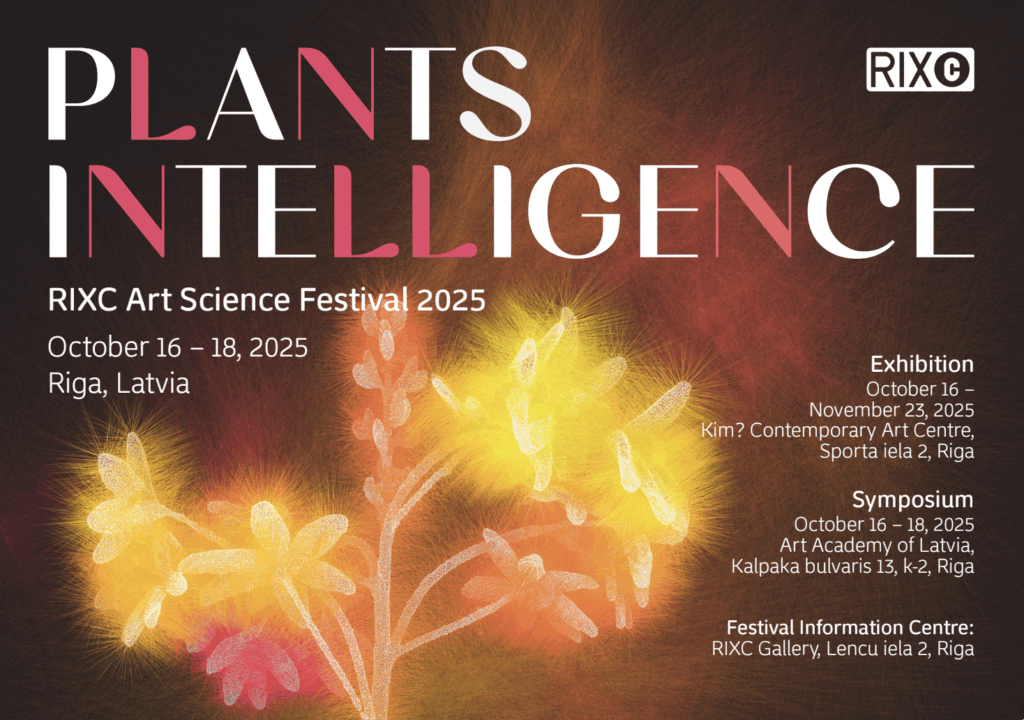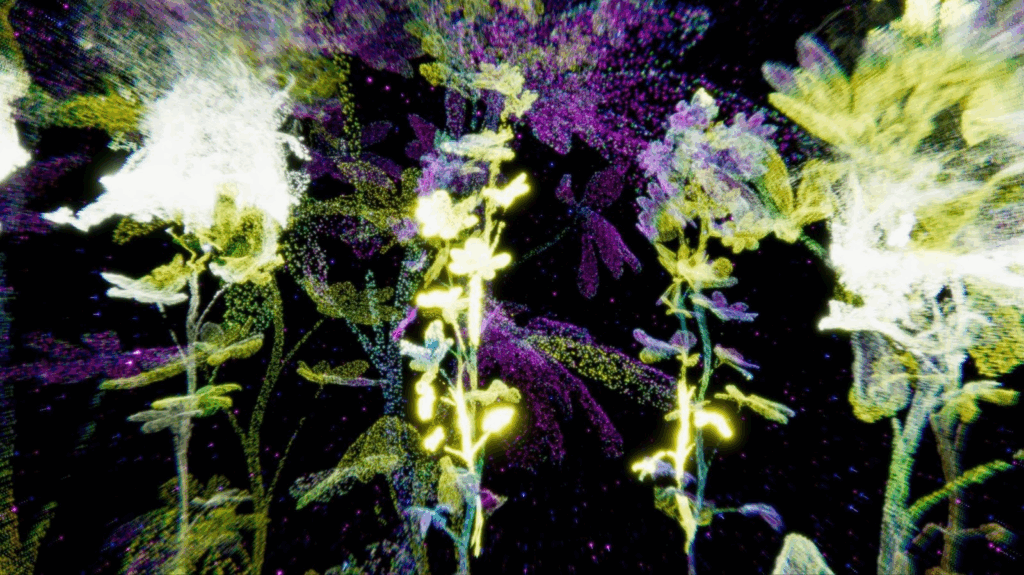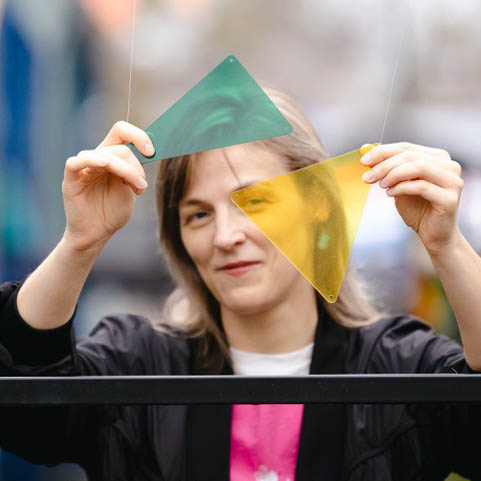RIXC Festival 2025 press release PDF
RIXC Festival 2025 press release DOCX
RIXC Festivāla 2025 preses relīze PDF
RIXC Festivāla 2025 preses relīze DOCX
RIXC Festival 2025 press photos ZIP
RIXC Festival 2025 PROGRAMME PDF
Opening Day: October 16, 2025
11:00 Press Conference and Tour
18:00 Festival Exhibition Opening

“Plants are our fellow travelers: humans completely live on them. Before the background of the current wasting of the world, we need to rethink other ways – vegetal ways – of worlding: ways that do not consume the world, but (re)produce it.” — Yvonne Volkart
This year, Riga-based RIXC Center for New Media Culture celebrates its 25th anniversary. Since its founding, local collaboration and international networking have been at the heart of RIXC’s development. In this spirit, the 2025 festival is created together with key partners from Latvia, the Baltic-Nordic region, Europe, and world-wide.
Over the years, RIXC has gradually developed a discourse of techno-ecologies at the intersection of art, science, and technology, exploring topics such as renewable futures, ungreening greenness, ecodata, post-sensorium, crypto art and climate, and symbiotic realities. This year’s leading theme, Plants Intelligence, is shaped in close collaboration with RIXC’s distinguished partners — the Basel-based research team of the Swiss National Science Foundation (SNSF)-funded project Plants_Intelligence. Learning Like a Plant of the Institute Art Gender Nature, Basel Academy of Art and Design FHNW, which over the past four years has investigated how plant evolution and vegetal intelligence can inspire new methods, knowledge, and aesthetic approaches in both lifestyle change and the arts. Their research findings — spanning Indigenous knowledge and ethnobotany, critiques of extractive agriculture, experiments in organic breeding, and explorations of how plants sense, adapt, and relate to light and atmosphere — provide the theoretical basis for RIXC’s anniversary festival edition.
This year’s public keynotes will be delivered by Argentinian philosopher and researcher Noelia Billi, Latvian eco-feminist and art theorist Jana Kukaine, and Swiss art and media theorist Yvonne Volkart — proponent of vegetal theory and principal investigator of the Plants_Intelligence research project. Together, their voices trace South–North and East–West tangents of vegetal mutual learning, opening spaces for shared thought.
The main festival program will take place October 16–18, 2025, in Riga, featuring the opening of the Plants Intelligence exhibition at Kim? Contemporary Art Centre and a symposium at the Art Academy of Latvia, with artist talks, research presentations, film screenings, and live performances. It will also present the Resonances of Nature project with a workshop, an interactive sound installation and performance, created through French, German, and Latvian collaborations. Further highlights include XR showcases by artists from the RIXC Field Residency, Taiwan-based Zone Sound, and Karlsruhe’s NAIA, along with the Symbiotic Futures Baltic–Nordic meeting.
The program is developed together with RIXC’s local, institutional, and international partners, each contributing unique perspectives to this anniversary edition.

Rasa Smite & Raitis Smits. Solarceptors, 2025. VR, still, courtesy of the artists
Plants Intelligence
Suggesting that current research shows plants to be more complex beings than previously assumed, this year’s RIXC festival theme is developed in collaboration with Yvonne Volkart and her team’s four-year research project Plants_Intelligence. Learning Like a Plant, funded by the Swiss National Science Foundation (SNSF), which negotiates the discourse of plant intelligence across the natural sciences, the humanities, and the arts. The four-year research project explored the notion of intelligence and its intertwining with mind, consciousness, communication, memory, decision-making, learning, and subjectivity, asking whether such conceptualizations make sense of vegetal life and whether they promote new perspectives on interspecies and terrestrial relationships.
To explore these questions, the Plants_Intelligence team — including art theorist Yvonne Volkart as principal investigator, and artists Felipe Castelblanco, Julia Mensch, and Rasa Smite — collaborated with partners in botany, plant ecology, seed and plant breeding, organic agriculture, food sovereignty, and Indigenous nations. While Argentina has circulated genetically modified seeds on a large scale since the 1990s, Switzerland has uniquely enshrined the dignity of the creature in its genetic engineering law. Drawing on laboratory experiments with plant decision-making, Indigenous plant–human alliances, and GMO-critical practices in South America, the team elaborates the im/possibilities of vegetal intelligence:
Felipe Castelblanco’s Plant Movements explores how plants communicate knowledge through medicine and agroecological models in the Andean-Amazon, where vegetal and human communities form alliances to sustain life and resist ecological threats. Julia Mensch’s Amaranth as Political Agent examines Argentina’s transgenic agriculture as a continuation of colonial terricide, highlighting Amaranth’s ecological agency as both a challenge to GM crops and a form of vegetal resistance. Rasa Smite’s Flower as Antenna and Attractor includes collaborations with Swiss breeding scientists at the Research Institute of Organic Agriculture (FiBL) and explores how flowering plants sense and interpret light, resulting in a VR visualization created together with Raitis Smits.
Analyzing diverse artistic research case studies at the crossroads of vegetal knowledge across South–North and East–West regions, Yvonne Volkart develops Vegetal Theory, proposing that underestimated vegetal processes can be aesthetically experienced, generating genuinely new knowledge about plants through the concept of intelligence.
More info on Plants_Intelligence Research Project: https://plants-intelligence.ch/

Felipe Castelblanco. Borrachero Dreams (Brugmansia Versicolor, Tabanok) 2024. © Felipe Castelblanco
Keynotes
Opening Keynotes: Thursday, October 16, 2025, 15:30 – Noelia Billi (AR), Jana Kukaine (LV)
Symposium Keynote: Friday, October 17, 2025, 15:00 – Yvonne Volkart (CH), with Zheng Bo (CN)
This year’s festival presents outstanding keynotes from different regions – the Global South, the European North, Central Europe, and Asia, bringing together perspectives of vegetal agency, ecofeminist theories, critical ecologies, and socially engaged art from distinct contexts:
Noelia Billi (Argentina) is a philosopher and researcher at Argentina’s National Scientific and Technical Research Council (CONICET), whose work focuses on posthuman materialism, critical ecologies, and vegetal logics of existence. In her keynote Open-Air Laboratories: Plant Aesthetics, Ecological Maps, and the Politics of World-Making, Billi addresses the ambivalent figure of the “open-air laboratory” as a site where technoscientific experimentation, ecological processes, and political struggles intersect. Drawing on Argentine cases, Billi explores plants as ecological maps that mediate between biovigilance and capitalist extraction while enabling alliances for imagining more habitable worlds.
Jana Kukaine (Latvia), a leading feminist art theorist in Latvia, is senior researcher at Riga Stradiņš University and the author of Visceral Aesthetics: Affect and Feminist Art in Postsocialism (2024). Her keynote Plant Turn and Feral Feminisms will introduce concepts such as plant awareness disparity and the vegetal self, reflecting on risks of anthropomorphism and presenting her collaborative idea of “feral intimacy” (with Zita Kārkla), framing walking in the forest as a feminist act.

Yvonne Volkart (Switzerland) is an art and media theorist, lecturer and head of research at the Institute Art Gender Nature (IAGN), Basel Academy of Art and Design FHNW, and principal investigator of the SNSF-funded research project Plants_Intelligence. Learning Like a Plant (2022–2025), which in its current closing stage is the main partner in this year’s RIXC festival edition.
In her keynote talk, Plant Intelligence – Towards a Vegetal Aesthetics, Volkart will discuss her thesis and the foundations of her proposed Vegetal Theory, in which she argues: If we want to change the dominant lifestyle and begin to co-compose the world with plants, we must learn from them, think with them, and act with and through them. Also, in the arts. Her talk will continue in conversation with Zheng Bo, a Hong Kong–based artist (joining remotely) whose work is devoted to more-than-human vibrancy – investigating the past and imagining the future from the perspectives of marginalized communities and marginalized plants.
Plants Intelligence Exhibition
Opening: Thursday, October 16, 2025, 18:00
On view until: November 23, 2025
Venue: Kim? Contemporary Art Center
The Plants Intelligence exhibition at Kim? Contemporary Art Centre in Riga is conceptually and thematically developed in cooperation with the SNSF-funded research project Plants_Intelligence. Learning Like a Plant (2022–2025), and features its outcomes. The exhibition also includes other works in which artists explore the intelligence of plants through scientific, artistic, indigenous, anthropological, imaginative, and speculative perspectives.
Artists: Uģis Albiņš (LV), Ursula Biemann (CH), Felipe Castelblanco (CO/CH), Karine Bonneval (FR), Gints Gabrāns, Arnis Rītups (LV), Nicholas Kahn & Richard Selesnick (FR/US), Julia Mensch (AR/CH), Marc Lee (CH), Ayënan Quinchoa Juajibioy (CO), Rasa Smite, Raitis Smits (LV), Zheng Bo (CN).
Curators: Yvonne Volkart (CH), Raitis Smits (LV)

Nicholas Kahn & Richard Selesnick. King of Weeds. 2012. Copyright of the authors.
Resonances of Nature: Workshop and Public Presentations
Opening of Immersive sound installation Māja by Marylou Petot (FR) – October 16, 2025, 14:00
Performance: Klimaton – October 17, 18:00
Workshop: Klimaton by Adnan Softić (DE) – October 18, 15:00–18:00
Venue: Art Academy of Latvia, K2, Riga (Onsite only)
Another thematic perspective comes through collaboration with one of the RIXC’s longstanding partners, the Goethe-Institut Riga, which this year joins with the French Institute in Latvia to present the Resonances of Nature project, supported by the Franco-German Cultural Fund.
This program presents Māja, an immersive interactive sound installation by French sound artist Marylou Petot, created in collaboration with the Nature Education Center at Ķemeri National Park using field recordings of Latvian birds. Based in Paris, Marylou Petot explores the relationship between technology and nature, using electronic media to heighten perception and reimagine fragile ecosystems. Together with German artist Adnan Softić and Latvian collaborators, she will also present the outcomes of the Resonances of Nature project at the RIXC Festival symposium.
German artist Adnan Softić contributes collaborations around his Klimaton Arctic, a musical instrument that transforms scientific data from the MOSAiC Arctic expedition into sound, making the climate crisis tangible through immersive listening. Based in Berlin and Sarajevo, Softić works across art, film, music, and theatre, often with Nina Softić, exploring the intersections of aesthetics, politics, and ecology.
The Klimaton performance will feature Latvian sound artists Normal Babyy and German artist Thies Mynther, who blend electronic music with Arctic soundscapes. In addition, Adnan Softić will lead a hands-on workshop, inviting artists to experiment with the instrument and engage creatively with climate change through listening and reflection.

Marylou Petot. Māja, 2024–ongoing. Photo: Zoé Thiburs
Symposium
Day 1: October 17, 10:00–17:00. Plants Intelligence / Research Presentations and Artist Talks
Day 2: October 18, 10:00–15:00. Resonances of Nature / Symbiotic Cities / SensUs Art XR Tour
Venue: Art Academy of Latvia, K2
The symposium will feature presentations and discussion panels with artists from Plants_Intelligence and Resonances of Nature, alongside a diverse lineup of international contributors from Europe and beyond — from the Nordic countries and Canada to South America and Asia — who bring fresh global perspectives to the dialogue between art, science, and nature.
It will also include presentations by this year’s RIXC Field Residency artists and a guided tour of their new works in the Symbiotic Cities AR exhibition on the SensUs platform, co-curated and co-produced by RIXC in partnership with NAIA (Karlsruhe) and Zone Sound Creative (Taipei).
In addition, a Baltic–Nordic extended meeting will take place, contributing to the launch of the new Symbiotic Futures network by RIXC and its partners — Maajaam (Estonia), Isop (Denmark), SENT (Norway), Lorna (Iceland), and Institutio Media (Lithuania). This initiative will further develop the extended SensUs Art XR platform, now joined by SLOlab (Toronto), KUBU (Finland), and other new partners, culminating next year in a joint XR exhibition.
Film Screenings and Performances
Date: Saturday, October 18, 20:00
Venue: Art Academy of Latvia, K2, Riga
“Kiwicha” (performance-lecture, 18 min by Julia Mensch (AR/CH) and video-song, 5 min by Sofía Viola (AR) in cooperation with Julia Mensch (AR/CH))
“Borrachero Dreams” (2025, 12 min), “Inverted Oasis Part 1” (2025, 13 min), “Rio Arriba” (2021, 14 min) by Felipe Castelblanco (CO/CH)
“Quemas de Páramo en el Pueblo Quillacinga” (2022, 11 min), Video Reporte por Ñambi Rimai Colectivo de Medios (CO)

Julia Mensch. Kiwicha. 2025
We thank you all – at RIXC’s 25th Anniversary
This year marks the 25th anniversary of RIXC. Since its founding, local collaboration and international networking have been at the heart of our mission. Over 28 festival editions, RIXC has collaborated with more than 2000 artists, researchers, theorists, activists, and other lateral thinkers and practitioners.
We extend heartfelt thanks to all those who have shaped RIXC along the way: the many artists, researchers, theorists, activists, curators, editors, and collaborators of our gallery, festival, and residency programs; the contributors to the Acoustic Space journal and Renewable Futures book series; and our partners in a wide range of networked collaborations. These include pioneering initiatives such as Xchange Internet Radio and the NICE Baltic–Nordic Network in the 1990s; groundbreaking projects of the early 2000s such as Acoustic Space Lab, Locative Media, and Waves; and, in the last decade, techno-ecological perspectives developed through European and Baltic–Nordic collaborations such as Techno-Ecologies, Renewable Futures, and Green Revisited. We also thank our colleagues in academic networks like SLSA-EU and Media Art Histories, along with more recent European partnerships such as EMAP and AUGE, and extend our gratitude to new global partners from Taiwan, Canada, and beyond who will join us in the future.
RIXC would not be what it is without its community — the local and international partners across the Baltic and Nordic region, Europe, and worldwide — whose creativity and commitment continue to inspire us. We thank you.
– – – – – – – – – – – – – – – – – – – – – – – – – – — – – – – – – – – – – – – – – – – – – – – – – – – – – – – – – – – – – – – – – – –
Organizers
RIXC Centre for New Media Culture
Curators: Rasa Smite and Raitis Smits rixc@rixc.org
Producer: Agnese Baranova agnese@rixc.org +371 29635167
Festival and Press Coordinator: Lelde Gūtmane rixc@rixc.org +371 28 365 323
PR and Information: Līva Siliņa rixc@rixc.org
Symposium Coordinator: Daina Siliņa daina@rixc.org
– – – – – – – – – – – – – – – – – – – – – – – – – – — – – – – – – – – – – – – – – – – – – – – – – – – – – – – – – – – – – – – – – – –
Support and Partners
State Cultural Capital Foundation of Latvia, Riga City Council, Pro Helvetia, Swiss National Science Foundation (SNSF), Institute Art Gender Nature, Basel Academy of Art and Design FHNW, Goethe-Institut Riga, French Institute in Latvia, Franco-German Cultural Fund, Nordic-Baltic Mobility Programme for Culture, Department of Cultural Affairs – Taipei City Government (Taiwan), Sonic Sensory Lab (Taiwan), Zone Sound Creative (Taiwan), NAIA – Naturally Artificial Intelligence Art Association (Germany), RTU Liepaja Academy, Maajaam (Estonia), Isop (Denmark), SENT (Norway), Lorna (Iceland), Institutio Media (Lithuania), Photinus Studio (Ukraine), SLOLab (Canada), Kim? Contemporary Art Centre, Art Academy of Latvia, SPORTA 2 quarter, We Make Money Not Art, Arterritory, Echo Gone Wrong, REVERIE Trading Group, LG Electronics.
– – – – – – – – – – – – – – – – – – – – – – – – – – — – – – – – – – – – – – – – – – – – – – – – – – – – – – – – – – – – – – – – – – –
Contacts
RIXC Center for New Media Culture / RIXC Gallery / Festival Information Center
Address: Lenču iela 2, Riga, LV-1010, Latvia
E-mail: rixc@rixc.org
www.rixc.org | festival2025.rixc.org
Phone:
+371 26546776 (office)